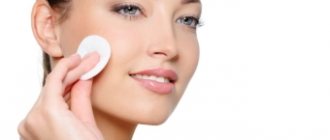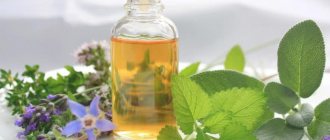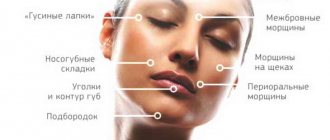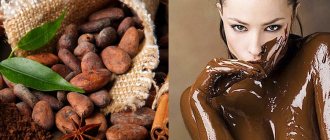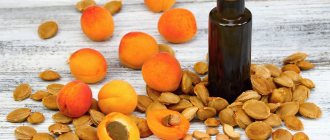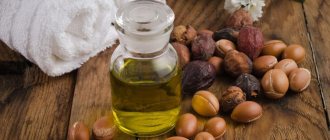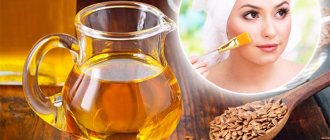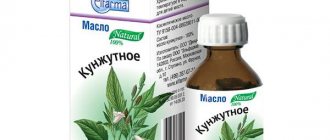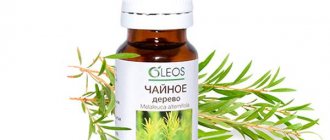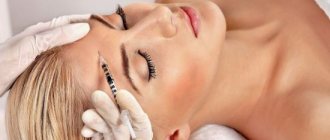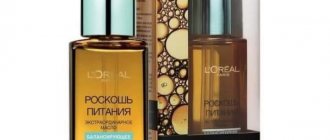The effectiveness of oils in cleansing the skin
Those with oily skin may find it difficult to imagine how to apply vegetable oil to their face. At first glance, it will only enhance the unpleasant effect, but in reality the opposite is true: oils from various plants, entering the pores, begin to dissolve sebaceous secretions (according to the principle of “like for like”), since the chemical properties of vegetable fats are similar to animal lipids.
Blackheads are also called open comedones; they form when pores become clogged with a mixture of sebum and dead skin cells
According to women who have used this method of cleansing, after washing off the oil, the following are observed:
- deep cleansing of impurities, feeling of “breathing” skin;
- softness and velvety skin;
- even, lighter complexion;
- skin elasticity due to improved blood microcirculation;
- healing of small wounds and relieving inflammation.
And some types of oils, with long-term use (more than 4 weeks), even reduce wrinkles and tighten the oval of the face (avocado, jojoba).
It is important to remember that immediately after the cleansing procedure, the oil must be washed off. Otherwise, the substance will clog pores and continue to destroy the protective fat layer of the skin, which will cause inflammation, peeling and drying of the epidermis.
What stands out here are hydrophilic oils - special cleansers that contain, in addition to oil, an emulsifier. These mixtures turn into an emulsion on the skin, which is then easily washed off with water. Thus, such solutions do not clog pores and do not provoke inflammatory processes on the face.
Why should you love oil?
One has only to look at the composition, and you immediately understand that the oil is not a mistake! It contains a huge number of useful microelements : vitamins A, B, C, P, proteins, carbohydrates, procyanidin (a powerful antioxidant). Grapeseed oil has the highest concentration of linoleic acid of the entire spectrum of oils.
As you can see, the composition is very impressive. And it is precisely because of its composition that grape seed oil has the following beneficial properties for facial skin:
- The main property of grape seed oil is the regulation of sebum secretion by the sebaceous glands . This means that the oil is suitable for both oily and dry skin - everyone will get exactly what they need. But those with oily and problematic skin will especially love the oil.
- The oil has a pronounced anti-inflammatory effect . The oil perfectly soothes the face, and when absorbed by the skin, it neutralizes inflammation in pimples, acne, boils, and blackheads.
- Regenerating and exfoliating qualities . Due to its high concentration of linoleic acid and procyanidin, grape seed oil is an excellent remedy for blemishes, marks and acne scars.
- Nourishing, cleansing and rejuvenating qualities . Three properties that will literally transform your skin in the shortest possible time: it will become matte, smooth, without greasy shine, and wrinkles will be smoothed out.
But this is not the whole list of the positive qualities of the oil. I have highlighted only the most interesting ones for us. Believe me, grape seed oil is a very multifaceted remedy and is suitable not only for acne and blackheads! If you don’t have oil yet, be sure to buy it!
The price of grape seed oil is simply ridiculous - you can buy it for only 50-90 rubles!
To treat skin problems, you should buy cold-pressed grape seed oil - this production method retains the maximum amount of beneficial substances.
By the way, jojoba oil helps against acne much better due to its strong antiseptic and anti-inflammatory effect. Therefore, if the problem of acne is particularly acute for you, I advise you to read the adjacent article.
Oils that remove impurities from pores
Oils that can fight blackheads include herbal products and ready-made cosmetics. The first ones are divided into:
- basic, ensuring deep penetration of nutrients under the skin;
- essential, rich in vitamins and antioxidants.
Types of natural oils for blackheads on the face
To get rid of acne, so-called base oils with a large amount of polyunsaturated fatty acids are used. Such products rarely cause allergies, have almost no odor and penetrate deeply into the cells of the dermis. To enhance the effect, add a few drops of essential oils suitable for a specific skin type.
It is important to remember that the occurrence of allergic reactions is a contraindication to the use of any oil. An allergy test is carried out by applying oil to a sensitive area of the skin (elbow, wrist). After 24 hours, if itching or redness appears, intolerance to the product is determined.
After the cleansing procedure, natural oils are washed off with foam or gel for washing.
Castor
Castor oil is a viscous oil with an antibacterial effect, containing:
- vitamin E (skin nutrition);
- ricinoleic acid (light and even complexion);
- a complex of fatty acids (palmitic, linoleic, stearic acids) dissolves skin lipids and stimulates the production of natural collagen.
The oil softens and moisturizes the epidermis and has a regenerating effect. It is best perceived by dry skin; for sensitive skin it is recommended to use a minimal amount of product (2-4 drops applied to a cotton pad).
Castor oil is effective not only when taken orally, but also when applied to problematic facial skin
When applying oil to the face and leaving it like this overnight, an unpleasant effect is possible - the appearance of bags under the eyes or irritation. Dermatologists do not recommend keeping this product on the skin for more than 20 minutes.
Sunflower
Sunflower oil contains:
- vitamins A, B and E, which help the skin stay smooth and even;
- fatty acids (peanut, stearic, phytic, linoleic) moisturize and deeply cleanse the dermis;
- minerals (zinc, selenium, calcium, magnesium) normalize blood microcirculation.
The oil protects against ultraviolet radiation, evens out facial contours and improves skin tone.
Sunflower oil rarely causes allergies
If you use sunflower oil too often, without breaks, the dermis will begin to overproduce sebum and become even more polluted.
Grape seed
Lightweight and quickly absorbed, grape seed oil contains:
- tocopherol and ascorbic acid (wound healing and post-acne);
- omega-6 and 9 fatty acids (cleaning pores of blackheads);
- minerals (calcium, iron, magnesium) that reduce sebum secretion.
Suitable for all skin types, it is a preventative against comedones.
Grapeseed oil will help make your skin soft and velvety.
A low-quality product can worsen the condition of the skin, so it is important to pay attention to the smell of the oil: it should not have a strong aroma, the smell is subtle and unobtrusive.
Jojoba
Jojoba essential oil with vitamin E and collagen fibers helps the skin remain elastic and firm, heals damage and regulates the functioning of the sebaceous glands. Penetrates deeply into pores without clogging them and at the same time retains moisture in the skin cells. Especially helps those with oily skin.
Jojoba oil contains substances that resemble collagen in structure
If jojoba oil is used undiluted, it will cause an increase in unwanted facial hair. It is better to use the product with other oils in a ratio of 1:10 to avoid an unpleasant effect.
Linen
Flaxseed oil tightens the skin and moisturizes it due to its content of omega-3 and 6 fatty acids, fights inflammation and enhances the protective functions of the epidermis. Suitable for all skin types.
Traditional healers recommend taking flaxseed oil orally for the best effect in the fight against acne.
Flaxseed oil cannot be heated, because in this case oxidation reactions begin in it with the formation of free radicals harmful to the body (provoking strokes, tumors, heart disease). It is important to use the contents of the jar as soon as possible: oxidation occurs after oxygen enters. The oil should be stored in a cool, dark place. Otherwise, itching, redness and rashes on the skin cannot be avoided.
tea tree
Tea tree oil has a strong antibacterial effect (thanks to its constituents linalool, B-terpineol, cineole), normalizes the activity of the sebaceous glands and relieves inflammation. Thanks to viridofloren, which is part of the product, it promotes rapid regeneration of the skin and eliminates traces of post-acne. Recommended for oily and sensitive skin.
When using the oil, you should not be in the open sun, as there is a risk of burns (esters react with UV radiation).
Tea tree oil is famous for its antimicrobial effects
Pink
Essential oil obtained from rosehip inflorescences is actively involved in tissue regeneration (vitamins A and E) and helps fight pigment spots (terpenes - limonene, linalool). Normalizes the process of sebum secretion, gives the skin a matte appearance and relieves inflammation. Particularly suitable for dry and dehydrated facial skin.
When using rose oil, it is important not to heat it and not allow it to combine with flammable substances (other oils, alcohol), otherwise the product will lose its beneficial properties due to the destruction of the active acids at the molecular level.
Rose oil has a delicate aroma and light texture
Olive
Olive oil has many beneficial properties:
- restores skin elasticity (tocopherol, retinol, vikasol);
- prevents premature aging (linoleic acid);
- removes toxic substances from cells (antioxidant polyphenol).
The product does not dry out the skin, makes it elastic and fresh. Suitable for all dermis types.
Olive oil contains substances that protect against malignant tumors
Almond
Almond oil regulates sebum production and is suitable for any skin: it will dry out oily skin, and moisturize dry skin. The vitamins included in the composition (A, E, F) nourish the dermis, and fatty acids (folic, pantothenic, linoleic) promote intense hydration.
When using, the main thing is not to overdo it with the amount of product applied to the face, since excess oil can clog pores and cause inflammation.
Almond oil is used in medicine, in the pharmaceutical and perfume industries
Table: comparative characteristics of oils for blackheads
| Name | Course duration | Advantages | Flaws | Price |
| Castor | Every day for 14 days |
|
| 80–150 rub. |
| Sunflower | Twice a week for a month |
| Long-term use causes the opposite effect - oiliness increases, pores become clogged | 50–120 rub. |
| Grape seed | 1–2 times a week, once a month take a break for 7 days |
| An unnatural product causes allergies and dries out the skin (we monitor the quality) | 40–190 rub. |
| Jojoba | Once every 7 days |
|
| 44–76 rub. |
| Linen | 3–5 times a month |
|
| 55–280 rub. |
| tea tree | 1–3 times a week |
| May cause burns if exposed to direct sunlight | 30–75 rub. |
| Pink | 5 days with a week break |
| Destroyed by contact with hot ingredients of cosmetic products | 50–140 rub. |
| Olive | 2–3 times a week for a month |
| When heated, it loses its beneficial properties | 180–270 rub. |
| Almond | 3 times a week, once a month break for 5–7 days |
|
| 34–220 rub. |
Ready-made cosmetic oils that get rid of acne
Cleansing facial skin with natural vegetable oils causes controversy among cosmetologists and ordinary users. Opponents of this method of getting rid of impurities cite examples of deterioration in the condition of the dermis due to poor leaching of oils from the pores and increased sebum production. As an alternative, it is proposed to use hydrophilic oil - an industrial product consisting of oils and vitamins, as well as polysorbate. The latter makes the oily ingredients water-soluble, so that the pores remain clean and the skin “breathes”.
Hydrophilic oil, when mixed with water, forms an emulsion that removes impurities from the skin
Table: hydrophilic oils to combat blackheads
| Name | Description | Advantages | Flaws | Price |
| The Skin House Essential | Korean cleanser with olive, sunflower and rosehip oils |
| Difficult to remove stubborn makeup | 1400 rub. |
| Etude House Real Art | Includes three varieties - moisturizing, deep cleansing and soothing, containing apricot kernel, grape seed and coconut oils |
|
| 2100 rub. |
| Holika Gudetama All Kill | Product based on olive and sunflower oil |
|
| 1500 rub. |
| KAO Biore | Suitable for all skin types, contains mineral oil and citric acid |
|
| 900 rub. |
| NYX Stripped Off | Ultra-light cleanser with mineral oil |
|
| 600 rub. |
| Clinique Take The Day Off Cleansing Balm | A gentle facial cleanser that removes impurities and makeup, suitable for all skin types, containing safflower seed oil and rosemary |
|
| 2250 rub. |
Photo gallery: popular brands of hydrophilic oils
Oils from the Real Art line have a convenient dispenser and a memorable design
The Skin House Essential hydrophilic oil cleanses even the deep layers of the skin
Hydrophilic oil from the Korean company Holika Gudetama All Kill is one of the most popular in the world
NYX Stripped Off Cleansing Oil is Affordable
Clinique Take The Day Off Cleansing Balm solid oil for cleansing the skin has proven itself well on the market
The active ingredient in KAO Biore cleansing oil is not vegetable oil, but mineral oil.
DIY hydrophilic oil
When it is not possible to buy ready-made hydrophilic oil or such products are questionable due to their composition, you can try to make it yourself. To do this, you will need to stock up on basic vegetable oil (jojoba, almond, olive), essential oil and emulsifier.
Making hydrophilic oil with your own hands will not take much time and money.
Some cosmetologists do not recommend using essential oils for facial skin care. Since such products can cause severe allergies or dry out the epidermis.
Polysorbate is used as an emulsifier, sold in soap stores under the brand name “Twin-20” or “Twin-80”. The numbers in the name indicate the degree of dissolving ability of the emulsifier. The “20” value is better for essential oils, while the “80” value washes thick vegetable oils out of the pores well.
Cooking process:
- Take a clean, empty bottle with a cap.
- Pour 90 ml of base oil into it.
- Add 10 ml polysorbate.
- Close the bottle with a lid and shake 10–15 times.
- Open the lid and drop no more than 10 drops of essential oil into the solution.
The jar should be stored in a cool, dark place. The expiration date must be calculated based on the nearest date indicated on the bottles of the products used in the solution.
Video: how to make hydrophilic oil
Beneficial properties of grape seed oil for facial skin
The oil is obtained from grape seeds by hot or cold pressing. The latter method helps to preserve the maximum of valuable substances in this product. It is worth giving preference to this particular product when purchasing.
Grape seed oil has a greenish tint and a slight nutty aroma.
Thanks to its ultra-light structure, the oil is quickly absorbed, gently cares for the skin and moisturizes it without leaving an oily sheen. Its miraculous properties are explained by the content of a huge number of useful components:
- linoleic acid promotes rejuvenation and hydration;
- oleic acid normalizes metabolic processes in tissues and accelerates the elimination of toxins;
- flavonoids soothe inflammation, fight bacteria and prevent skin aging;
- chlorophyll has tonic and antimicrobial properties;
- The antioxidant resveratrol activates blood and lymph microcirculation and promotes collagen formation.
Grapes are the only plant for the study of which an entire science has been created - ampelography.
Tatiana Broner
https://beautyhack.ru/krasota/11-neozhidannyh-faktov-o-vinograde-kotorye-vy-ne-znali
The oil is saturated with macro- and microelements; it contains the following essential vitamins:
- vitamin E - helps strengthen capillary walls, has wound-healing properties, protects against ultraviolet radiation;
- vitamin A - prevents skin flaking, helps eliminate age spots;
- vitamin C - accelerates the production of elastic fibers and the removal of free radicals;
- vitamin PP - has a stimulating effect, refreshes the complexion;
- B vitamins - help fight age-related skin changes and are effective against acne.
Rules for using oils for blackheads
For cleansing procedures to be effective, precautions must be taken when handling vegetable oils. After all, their active components are very sensitive to temperature changes and sunlight. And essential oils are also strong concentrates, which, if used incorrectly, can cause harm to health.
When making hydrophilic oil, be sure to make a label indicating the expiration date of the product
How to properly use oils for blackheads:
- always dilute essential oils with base oils;
- strictly follow the dosage in recipes;
- if a burn from essential oil occurs, wipe the damaged area with a base oil;
- Always test for an allergic reaction;
- monitor the ability of oils to oxidize in the sun and do not apply them before going outside;
- mix no more than 5 oils in one composition (or better yet, limit yourself to three);
- When undergoing a course of treatment, do not use foundations that clog pores.
Ways to use vegetable oils to cleanse the face of acne - massage, washing, applying compresses and masks. Lotions are also made with these products based on mineral or distilled water.
When performing a facial massage, do not forget that the movements should be light and follow the massage lines.
The massage is carried out as follows:
- A mixture of oils (for example, castor and almond, mixed in a ratio of 1:10) is applied to a cleansed face.
- Massage the skin thoroughly for 5 minutes, especially in problem areas.
- Wet a towel under running hot water and apply it to your face until it cools.
- Wash off oil and dirt with slightly warm water and foam or cleansing gel.
Washing with oil is done like this:
- Apply 5-6 drops of oil to a cotton pad.
- Wipe the face, focusing on problem areas.
- Wash with foam or facial cleansing gel.
The mask involves adding other ingredients to the oil depending on your skin type:
- for fatty foods - egg white, 2 tbsp. l. grapefruit juice, 1 tbsp. l. white clay. Mix with 3 drops of orange oil, apply to cleansed face and keep for 10-15 minutes, rinse with cold water;
- for dry and normal skin - 1 tsp. honey, 2 tbsp. l. milk, half a teaspoon of salt. Mix with 2-4 drops of cardamom oil, apply for 10 minutes, rinse with warm water.
To apply a compress, the oil needs to be warmed up a little, then added to a bowl of warm water (3-4 drops per 200 ml). Soak a thin towel or cloth in the solution and apply it to your face until it cools completely. Repeat the procedure 5–7 times.
Video: getting rid of blackheads on the face in five days
If your skin is oily
As a rule, oily skin is also a problem type, and therefore various pathogenic elements and inflamed pimples almost constantly form on it. In this case, cosmetic products should not only eliminate excess oily skin, but also normalize the functioning of the sebaceous glands, which prevents further blockage of pores.
An excellent mask option in this case is a mixture of natural grape seed oil with avocado essential oil. The components should be taken in equal shares. For one-time application, it is recommended to mix 4 – 5 drops. Apply the finished composition to cleansed and steamed skin with light massage movements for 20 minutes, after which the remaining mixture should be carefully removed with a napkin.
Another treatment option in this case is applying a compress. To do this, apply a compress of gauze, folded in 4 layers and soaked in grape seed oil, to cleansed and steamed skin. Keep this compress for 20 minutes, after which the skin should be wiped with a cotton pad soaked in a strong aqueous infusion of medicinal chamomile flowers. With regular use of this method, the complexion improves significantly, and inflammation quickly disappears.
Benefits of coconut oil
Healing oil is extracted from the aromatic nutty pulp of coconut. Having a natural origin, the product has found application in various areas of life. Cosmetology has also become interested in its unprecedented benefits for beauty. Cosmetic companies began to add it to various products for face, hair, and body care. Its undoubted benefits as an antimicrobial and antiviral agent were noticed.
How is oil beneficial for the beauty of women of all ages? This oil product slows down aging, moisturizes the skin, protects from exposure to the sun, wind, frost, and saves from wrinkles. If wrinkles have already appeared, then when using ether, they will smooth out and become less noticeable.
Composition of the product
This unique product contains the following essential substances:
- Lauric acid – destroys fungus, pathogenic microorganisms, eliminates age spots, acne, inflammation, boils, activates the restoration of skin cells;
- Myristic acid – helps the beneficial elements of cosmetic preparations penetrate deep into the epidermis;
- Palmitic acid – promotes cell renewal, increases skin elasticity, whitens;
- Oleic acid – retains moisture, strengthens the protective barrier, reduces the impact of harmful substances;
- Capric acid – has antibacterial properties, rejuvenates cells;
- Groups of vitamins A, E, C, B, calcium, phosphorus, iron - rejuvenate the skin, stimulate collagen production, smooth out wrinkles.
What is coconut oil used for?
Girls who have never used coconut ether for beauty will be pleased to know that it can successfully replace a bunch of expensive cosmetics and salon procedures.
The tree of beauty gives people a product with the following properties:
- Slows down the aging of the skin due to its ability to maintain elasticity, maintain firmness, and tighten the oval of the face. Especially useful for mature women;
- More effective than pharmaceutical drugs, it relieves inflammation, acne, pimples, and does not dry out the skin;
- Relieves flaking and dryness. Many people use it to soften rough skin on elbows and corns;
- Normalizes the production of subcutaneous fat, therefore useful for oily dermis;
- Protects against UV rays during procedures in the solarium and while sunbathing on the beach;
- Used to treat many skin diseases: psoriasis, eczema, dermatitis.
Which oil is better for use: solid or liquid
Coconut product can be in either a solid or liquid state. Coconut extract in both states is beneficial if it is of good quality.
To check the quality of a liquid product, it must be placed in the refrigerator. If no foreign additives are introduced into it, the liquid oil will solidify, acquiring a milky white color. It becomes viscous even at room temperature.
In special departments of stores you can buy liquid refined ether. The liquid structure is also of high quality, it’s just that the manufacturing technology was different.
Liquid coconut oil is obtained by hot pressing coconut pulp or dry copra. Refined oil has fewer useful substances than unrefined oil, has a uniform structure, golden color, and has no taste or smell. The good thing about a liquid product is that it does not need to be melted, but can be immediately added to masks or face or body care products.
Solid oil is considered more useful, especially unrefined oil. It contains all the beneficial substances that are found in the plant.
Cold pressing technology is used to obtain it. Fresh coconuts contain a whole range of vitamins and microelements, which are transferred into the resulting product. This oil is completely natural and has no foreign additives.
Coconut oil for the face has a characteristic odor, heterogeneous structure, and has a milky white color. When brought to a liquid state, the valuable product becomes transparent, golden-yellow.
Egg white mask for blackheads
It will not only prevent the appearance of acne, but also help the skin get rid of excess oil. Egg white cleanses pores and tightens them. Albumin, a key ingredient present in protein, has the unique property of tightening pores. This mask will also help make your skin glow.
Ingredients:
- 1 egg white
- 1 teaspoon honey
Preparation:
Mix honey with egg white and apply the mixture to your face. Let it dry, rinse with warm water. Repeat once or twice a week, as needed. Best suited for oily and combination skin.
Unique composition
Let's figure out which of the components of coconut oil make it effective against acne:
- Lauric acid – more than half of it is in the product. This is what gives coconut oil the thick consistency at room temperature. It also serves as a natural barrier that protects the skin from the negative effects of sun rays. Lauric acid cleanses and tightens pores, and also reduces the activity of the sebaceous glands. And this is a valuable property for problem skin.
- Myristic acid is about a fifth of it. Gives the oil gliding properties and makes it an excellent base for massage. Increases the protective functions of the skin, relieves inflammation and creates an unfavorable environment for the proliferation of pathogenic microflora.
- Palmitic acid – stimulates the synthesis of hyaluronic acid, collagen and elastin. That is, it helps maintain skin turgor and elasticity. It stimulates rapid tissue regeneration and healing of acne wounds.
- Stearic acid – has anti-inflammatory, wound-healing, moisturizing, protective properties. Helps other beneficial nutrients penetrate deeper into the skin. Regulates the hydrolipid balance of the skin.
- Tocopherol is a strong natural antioxidant. Active stimulator of cell renewal. Promotes rapid healing of wounds and restoration of damaged skin. Slows down the aging process, neutralizes the harmful effects of free radicals.
- Vitamin A - retinol is able to influence the activity of the sebaceous glands and thereby normalize the hydrolipid balance. It quickly relieves redness and peeling and perfectly restores damaged epidermis.
- Vitamin C – ascorbic acid strengthens capillary walls and stimulates subcutaneous blood circulation. It has whitening properties, accelerates wound healing, prevents the appearance of scars from large acne, marks and post-acne spots.
As you can see, the composition of coconut oil for problem skin is almost ideal. All that remains is to learn how to properly use its advantages.
What are blackheads
Comedones or blackheads on the face appear on oily skin as a result of partial or complete blockage of the sebaceous glands. As a result, sebum cannot leave the ducts, and the pores expand and become dirty. Solving this problem will require regular procedures and a careful approach.
Due to their good penetrating ability, esters help cleanse pores.
It must be remembered that esters are not used in their pure form, as they are highly concentrated. Most often, masks and compresses are made with them.
This rule does not apply to lavender and tea tree oil. They can be used 1-2 drops, applied to a cotton swab to wipe the problem area.
Acne on the face: causes, cosmetic cleansing
Most often, acne on the face occurs under the influence of the following factors:
- Poor nutrition, predominance of heavy, fatty foods and confectionery products.
- Bad habits: smoking and drinking alcohol negatively affect metabolic processes in the body.
- Hormonal disbalance. Changes in hormonal levels during puberty, pregnancy, or due to the development of internal pathology cause the sebaceous glands to work too intensely.
- Failure to comply with hygiene standards.
- Abuse of cosmetics, use of inappropriate skin care products.
Also, the appearance of acne on certain areas of the face can signal the presence of certain diseases. You can find out the exact cause by consulting a dermatologist. Acne treatment is a set of measures that includes cleansing the skin. To do this, you can use professional cosmetics: gels, scrubs and tonics or folk remedies based on herbal ingredients.
There are several general recommendations for using coconut milk at home. Before carrying out cosmetic procedures, the skin should be thoroughly steamed with hot water and a towel to open the pores. The oil should be rubbed in with gentle massaging movements, starting from the cheeks and gradually moving to the forehead and chin. The areas around the mouth and eyes should not be treated. After completing the procedure, the face should be washed with plain clean water or a herbal rinse.
To combat acne and post-acne, you can apply coconut oil to the affected areas. To enhance the cosmetic effect, you can mix it with other oils:
- linen;
- rosemary;
- tea;
- caraway;
- jojoba;
- rosehip oil.
The procedure is carried out twice a day for 1-2 weeks. Coconut oil can also be simply added to your daily care products: washes, lotions and scrubs. It is enough to mix a couple of drops with a regular portion of the product right before use.
How to prepare your own cleansing masks, compresses and scrubs with coconut oil:
- Scrub with coffee and honey. You need to mix two parts of coconut milk and honey and add one part of ground coffee, then bring all the ingredients to a homogeneous mass. The product is suitable for treating acne not only on the face, but also on the skin of the back, neck and chest.
- Mask with honey and aloe. To prepare, you need to mix two parts each of coconut oil, linden honey and five parts of aloe juice. Apply the product to the face in even layers, without treating the lips and skin around the eyes, keep for 20-30 minutes and rinse with warm water.
- Mask for all skin types. You need to mix two parts of coconut milk and any honey with one egg yolk. The mass is heated, rubbed into the inflamed areas and washed off after 20 minutes. The procedure is repeated every other day until the acne disappears completely.
- Chocolate-coconut mask. 50 g of pure dark chocolate without flavoring is mixed with a tablespoon of coconut milk and applied to the face for 5-10 minutes every three days.
- Effective mask with persimmon and honey. You need to take one teaspoon each of coconut oil, starch and honey, add an egg yolk and one persimmon and mix all the ingredients until smooth. The mask is kept on the face for 20-30 minutes and washed off with cool water or chamomile infusion, after which the skin should be moisturized with cream.
It is important to use high-quality coconut milk: it should be transparent with a slight amber tint and a pleasant sweetish (not pungent) smell. After completing cosmetic procedures, oil should not be left on the skin: it should be removed to prevent clogging of pores.
Essential oils and their uses
Any beauty salon offers many procedures for cleansing the skin of the face and its problem areas. However, not all of these procedures and products are effective against disturbing defects and are completely harmless to the skin, unlike ethers.
Essential oils are a mixture of odorous substances obtained mainly from the flowers and fruits of plants. The main thing is to initially identify the existing problem and select the necessary ethers to solve it.
Due to their cleansing and anti-inflammatory properties, the most effective in treating acne and blackheads are:
- Tea tree oil;
- Citrus;
- Rosemary;
- Sage;
- Ylang-ylang;
- Eucalyptus;
- Castor;
- Sandalwood.
To reduce oily skin, sage and lemon oils are suitable; to get rid of oily shine, use mint, cypress, and orange oils; tea tree, bergamot, grapefruit and rosemary will help to reduce sebum secretion and cleanse pores. To reduce inflammation and redness of the skin, use ylang-ylang and chamomile, and castor oil against comedones and acne. And to smooth the skin, take lemon and lavender.
One of the most effective esters is tea tree oil, which destroys blackheads and reduces oily skin. It has antiseptic and antimicrobial properties, and, in combination with base olive or jojoba, is also used for hair.
Castor oil, due to its antibacterial properties, reduces the number of acne and blackheads.
Ylang-ylang has a pleasant aroma, is rich in vitamins, makes the skin smooth, gently cleansing it. It has moisturizing and matting properties.
To make your skin healthy and glowing, you need to put in a lot of effort: select and purchase oils, make a mask. But all this is worth the effect that you will notice after just a week of treatment, subject to constant use.
